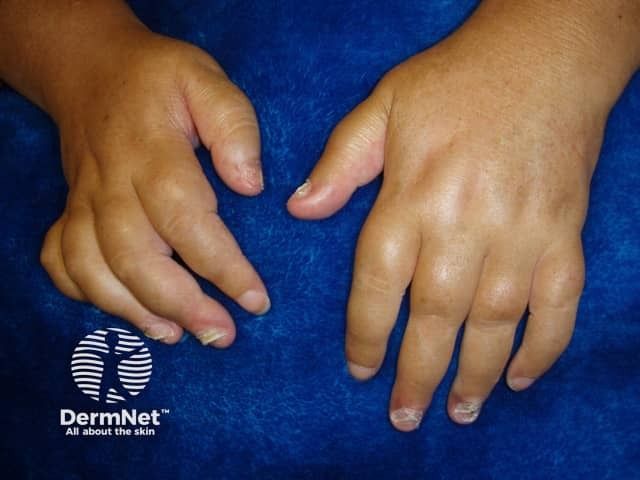- Case-Based Roundtable
- General Dermatology
- Eczema
- Chronic Hand Eczema
- Alopecia
- Aesthetics
- Vitiligo
- COVID-19
- Actinic Keratosis
- Precision Medicine and Biologics
- Rare Disease
- Wound Care
- Rosacea
- Psoriasis
- Psoriatic Arthritis
- Atopic Dermatitis
- Melasma
- NP and PA
- Skin Cancer
- Hidradenitis Suppurativa
- Drug Watch
- Pigmentary Disorders
- Acne
- Pediatric Dermatology
- Practice Management
- Prurigo Nodularis
- Buy-and-Bill
Article
Quality of life: Combination therapy improves, controls psoriasis
Combination therapy has a role in the treatment of psoriasis, particularly when there is a loss of response with monotherapy using biologic agents. Methotrexate, systemic retinoids, or phototherapy can be part of a combined therapy with biologic agents.

Key Points
Dallas - Combination therapy is frequently utilized to ensure that patients maintain adequate control of psoriasis, according to Alan Menter, M.D., chairman of the psoriasis research unit at the Baylor University Medical Center in Dallas.
"It's a quality-of-life issue. If you ask patients with psoriasis what they fear the most, it's being allowed to flare after a period of improvement, and not being able to maintain normal relationships and function in society," Dr. Menter says.
Without effective treatment, psoriatics have diminished quality of life, he says.
According to Dr. Menter, biologic agents for psoriasis that have been in use in North America and Europe over the past six years are frequently effective in the short term, but may fail to provide a sustained response in patients.
Whether this is driven by antibody production, such as against the anti-tumor necrosis factor (TNF)-alpha agents, the natural history of the disease, or unknown antigenic triggers factors, is unknown.
When loss of response occurs, the addition of another therapy may be needed to sustain response.
Methotrexate
One of the most common add-on therapies is methotrexate, which is still considered a first-line monotherapy for psoriasis globally, because it is inexpensive and has stood the test of time, says Dr. Menter, who also chairs the International Psoriasis Council.
However, there are disadvantages to using methotrexate, including gastrointestinal side effects, the need for careful monitoring including potential liver biopsies after 3 gm to 4 gm total dosage, and its contraindication in women of childbearing potential who are trying to get pregnant, as well as in their partners, he says.
Prior to the availability of biologic agents, clinicians would rotate use of systemic agents to avoid unwanted side effects, Dr. Menter tells Dermatology Times.
Flare-ups
Frequently, clinicians cannot pinpoint the reason for a flare-up of psoriasis, so the choice of an additional therapy to the initial therapy with a biologic agent is not yet a tailored therapeutic decision, and much of the evidence for the addition of methotrexate, for instance, is based on combination therapy being effective to treat other immune-mediated conditions with TNF-alpha inhibitors, such as Crohn's disease or rheumatoid arthritis, according to Dr. Menter.
"Nine times out of 10, patients get a flare-up out of the blue. We may have beautiful control, and a flare-up occurs without any major episodes of stress in their life or without the presence of any infection, such as streptococcal.
"There may have been a new antigen that has been introduced that we have no knowledge about, or there is a loss of efficacy of the drug due to patients developing antibodies for the drug," Dr. Menter says.
Dr. Menter predicts that greater research in pharmacogenomics will, in the future, permit clinicians to target therapy more specifically and individually for psoriasis patients, to reduce side effects and ensure and maintain optimal response.
Dosing
Reduced doses of methotrexate - doses of 10 mg per week rather than the standard 10 mg to 20 mg - can frequently be administered in conjunction with a biologic agent to produce a sustained response in patients.
Cyclosporine is another drug in the dermatologist's armamentarium that can be selected as an "interventional" add-on therapy to a biologic agent for three to four months to ameliorate a flare of psoriasis and help to achieve longer-term control of psoriasis.
Systemic retinoids - frequently in small doses of 10 mg a day - also augment efficacy of a biologic agent, particularly in cases in which patients prove refractory to monotherapy.
A small study that Dr. Menter and colleagues published last year in the International Journal of Dermatology found the majority of patients with moderate-to-severe plaque psoriasis experienced some improvement to total clearance of their psoriasis with acitretin.
Phototherapy
A study published in the Journal of Drugs and Dermatology in 2006 examined the impact of alefacept in combination with UVB phototherapy to treat chronic plaque psoriasis in an open-label fashion.
Investigators found the combination therapy was well-tolerated, improved psoriatic symptoms, and had no cumulative effect on T cells after multiple courses of therapy. Likewise, the addition of UVB therapy to etanercept has been shown to produce a significant additive effect.
A disadvantage of phototherapy is that it requires regular attendance to a clinic for two or three times per week for weeks to months, creating inconvenience for the patient's day-to-day life, Dr. Menter says.
Phototherapy units may be installed in the home in cases in which patients are based at a far distance from their healthcare facility.
The Food and Drug Administration's expected approval of ustekinumab, a monoclonal antibody that reduces the production of IL-12 and IL-23, will likely affect the choice of therapy for psoriasis patients.
Time will tell whether the majority of patients are able to maintain long-term adequate control with this agent or whether a proportion of patients will also need potential "add-on" therapies, Dr. Menter says.
Disclosure: Dr. Menter has been a consultant and/or investigator and has received financial compensation from the following companies: Abbott, Allergan, Amgen, Astellas, Asubio, Celgene, Centocor, DUSA, Eli Lilly, Galderma, Genentech, Novartis, Novo Nordisk, Pfizer, Promius, Stiefel, Syntrix Biosystems, Warner Chilcott and Wyeth.





